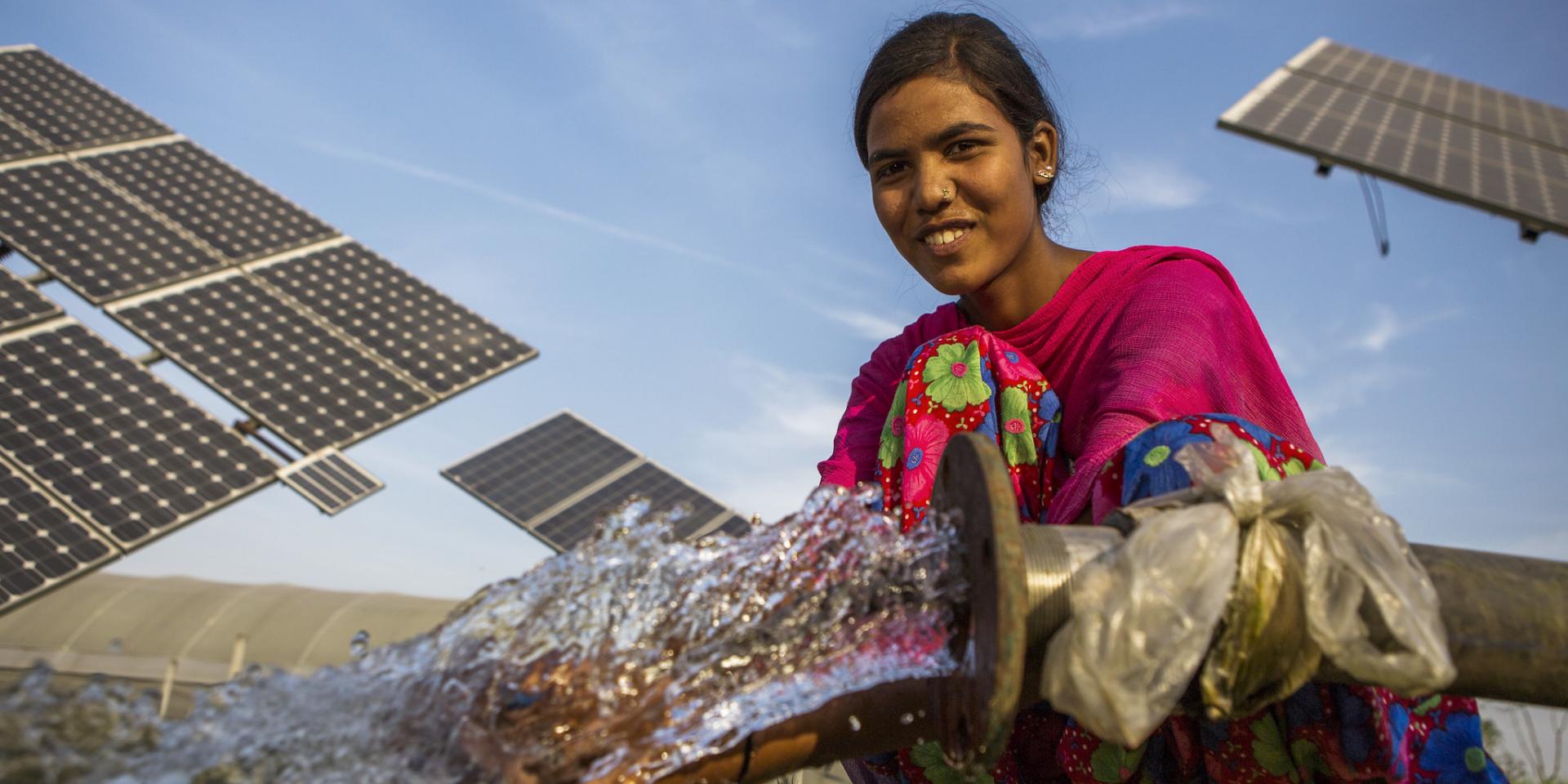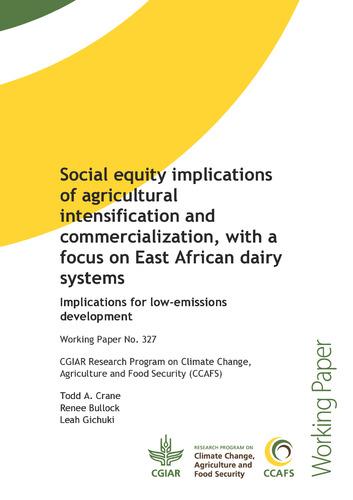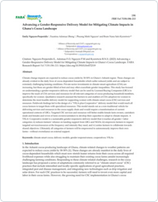Climate mitigation efforts can increase women’s resilience and empowerment in agri-food systems
 Photo: Prashanth Vishwanathan/IWMI.
Photo: Prashanth Vishwanathan/IWMI.
Key messages:
- Climate mitigation efforts have the potential to increase women’s resilience and empowerment in agri-food systems—if the root causes of gender inequality are addressed in how mitigation technologies and practices are designed and implemented.
- Different climate mitigation technologies—such as solar-powered drip irrigation, home biodigesters and precision agriculture technologies—can reduce women’s labor burden, boost incomes and promote more equal gender relations. Climate mitigation practices—including low-emissions dairy development, integrated landscape management and agroforestry—also increase women’s resilience to climate change.
- However, integrating climate mitigation technologies and practices may create trade-offs between mitigation success and intensification of women’s unpaid labor in agri-food systems.
- Promising strategies for addressing gender inequalities in climate mitigation efforts are diverse and include:
- using gender-responsive delivery models and training for integrating mitigation technology
- addressing harmful gender norms to support women’s participation and benefiting from low-carbon agricultural value chains
- providing financial incentives for women-controlled renewable energies in agri-food systems
- supporting women in accessing carbon markets and trading schemes that reward low-carbon agricultural practices
Climate resilience in agri-food systems is achieved through both climate mitigation and climate adaptation efforts. Climate change adaptation and climate change mitigation are distinct concepts, and they have different implications and objectives within agri-food systems.
Adaptation is about adjusting and making changes to reduce the vulnerability of agricultural systems to the existing and anticipated impacts of climate change. Climate adaptation in agri-food systems focuses on building resilience to current and future climate-related risks—so adaptation strategies include the diversifying rural livelihoods, creating community-based early warning systems, and implementing social safety nets such as insurance programs to cope with climate-induced shocks.
Climate mitigation in agri-food systems refers to efforts that reduce or prevent the emission of greenhouse gases and minimize other negative environmental impacts associated with agricultural practices and food production. The goal is to contribute to the global effort to mitigate climate change by addressing the carbon footprint and environmental sustainability of the agri-food sectors.
Lack of organized evidence about gender and climate mitigation technologies and practices in agri-food systems
While there is a significant body of agricultural research for development (AR4D) on the gender dimensions of climate change adaptation, there is no similar organized literature on gender and climate mitigation technologies and practices in agri-food systems.
To fill this knowledge gap, we conducted a scoping review (forthcoming) of literature and learnings on the gender dimensions of climate mitigation efforts across six areas of practice in agri-food systems:
- agroecology and land restoration
- agroforestry
- climate-smart, conservation and precision agriculture
- improved livestock management
- renewable energy
- water conservation
We reviewed 50 scientific studies across 23 countries in-depth. The analysis also includes case studies from gray literature and data collected by interviewing seven gender experts.
Different climate mitigation technologies and practices have improved women’s resilience and empowerment
Our review explores the different types of climate mitigation efforts—technologies and practices—meant for women in agri-food systems, and how they have impacted women’s resilience and empowerment.
Both concepts are broadly defined. Women’s empowerment encompasses actions that increase women’s ability to make strategic life choices and act on them, and resilience included women’s well-being outcomes such as more income, better nutrition and fewer health risks.
Our review reveals that:
- Women’s resilience (e.g., improved health, nutrition and food security) from mitigation efforts were widely reported. For example, reducing fuelwood collection by using fuel-efficient stoves reduced women’s concerns about gender-based violence; reduced air pollution from renewable energy technologies such as fish smokers, biodigesters and fuel-efficient stoves improved women’s health outcomes; and coffee-growers in Colombia who used biodigesters reduced women’s kitchen labor by two hours per day.
- Women’s empowerment increased because of a variety of climate mitigation efforts: mitigation practices such as agroecology and land restoration improved intrahousehold decision-making and equality, and increased women’s leadership at the community level (PDF, 2.8 MB). Agroforestry schemes that pay women for ecosystem services economically empowered women.
Climate mitigation efforts may have trade-offs that intensify gender inequalities
Sometimes, potential environmental and social ‘wins’ associated with climate mitigation can be offset by trade-offs that intensify gender inequalities. These include women losing agency over activities, such as losing decision-making power, men co-opting technologies and income, and women being physically exhausted from extra labor.
Most of the studies we reviewed fail to indicate how the ‘wins’ could be offset by the trade-offs. However, understanding women’s priorities about these potential trade-offs is critical, because efforts may be unwanted if women have different priorities—for example, prioritizing land use change for cash crops or renting over landscape restoration.
Codesigning and co-implementing interventions with women’s collectives and cooperatives can help ensure women’s and men’s different needs, priorities and realities are considered in climate mitigation efforts.
Gender-responsive strategies that do promote women’s resilience and empowerment goals in climate mitigation efforts
- Integrating and training in climate-smart mitigation technology. Promote the integration of climate-smart mitigation technologies—such as precision farming, renewable energy and sustainable land-management practices—and provide training programs that include women and marginalized groups. Gender-responsive delivery models that target extension services and resources for different categories of farmers based on their gender and landholding status (e.g., women and men farmers, caretakers, and wives of farmers/caretakers) can bridge gender gaps in access to inputs for and information on climate mitigation technologies and practices.
- Integrating low-carbon agricultural value chains. Support women’s participation in sustainable value chains related to low-carbon agriculture, ensuring they have access to markets, financial resources, and training to promote eco-friendly processing, packaging and transportation practices.
- Using gender-transformative approaches. Gender inequality caused by discriminatory norms at family and community levels hamper women fully participating in and benefiting from agricultural value chains. Efforts that used gender-transformative social interventions such as innovation platforms, community conversations, and intra-household methodologies made inroads to challenging discriminatory gender norms and promoting changes towards gender equality.
- Providing financial incentives to increase women’s access to and control over renewable energy. These incentives can facilitate women’s access to and ownership of renewable energy technologies (e.g., solar-powered irrigation) which can strengthen mitigation goals and women’s resilience. Women’s lack of access to financial, agricultural and natural resources are near-universal constraints to adopting mitigation practices and technologies. In addition to providing credit then used to purchase climate mitigation technologies, village savings and loans associations often facilitated women’s access to farm inputs such as better livestock breeds, solar market gardens, threshers, fish smokers, and more.
- Supporting access to carbon markets and certification schemes. Support women's collectives and cooperatives to access carbon markets and certification programs to incentivize sustainable farming practices that sequester carbon or reduce carbon emissions. For instance, the W+ Standard, based on women’s contribution to climate mitigation work, measures and monetizes women’s empowerment within agricultural projects and supply chains.
Suggested citation:
Tavenner, Katie and Ranjitha Puskur. 2023. Climate mitigation efforts can enhance women’s resilience and empowerment in agri-food systems. Evidence Explainer. Nairobi, Kenya: CGIAR GENDER Impact Platform.
References
Empowering Women and Building Sustainable Food Systems: A Case Study of Cuba's Local Agricultural Innovation Project
Benítez Barbara, Nelson Erin, Romero Sarduy María Isabel, Ortíz Pérez Rodobaldo, Crespo Morales Anaisa, Casanova Rodríguez Caridad, Campos Gómez Maybe, Méndez Bordón Aliek, Martínez Massip Annia, Hernández Beltrán Yaima, Daniels Jordan. 2020. Empowering Women and Building Sustainable Food Systems: A Case Study of Cuba's Local Agricultural Innovation Project. Front. Sustain. Food Syst., 19 November 2020. Volume 4. https://doi.org/10.3389/fsufs.2020.554414

Social equity implications of intensification and commercialization in East African livestock systems: Implications for low-emission development

Advancing a Gender-Responsive Delivery Model for Mitigating Climate Impacts in Ghana’s Cocoa Landscape
- Nguyen-Perperidis E., Adomaa F.O, Nguyen P.M and Kyeretwie B.N.S. 2023. Advancing a Gender-Responsive Delivery Model for Mitigating Climate Impacts in Ghana’s Cocoa Landscape. FARA Research Report Vol 7(19):196-213. https://policycommons.net/artifacts/3745223/advancing-a-gender-responsive-delivery-model-for-mitigating-climate-impacts-in-ghanas-cocoa-landscape/4551151/